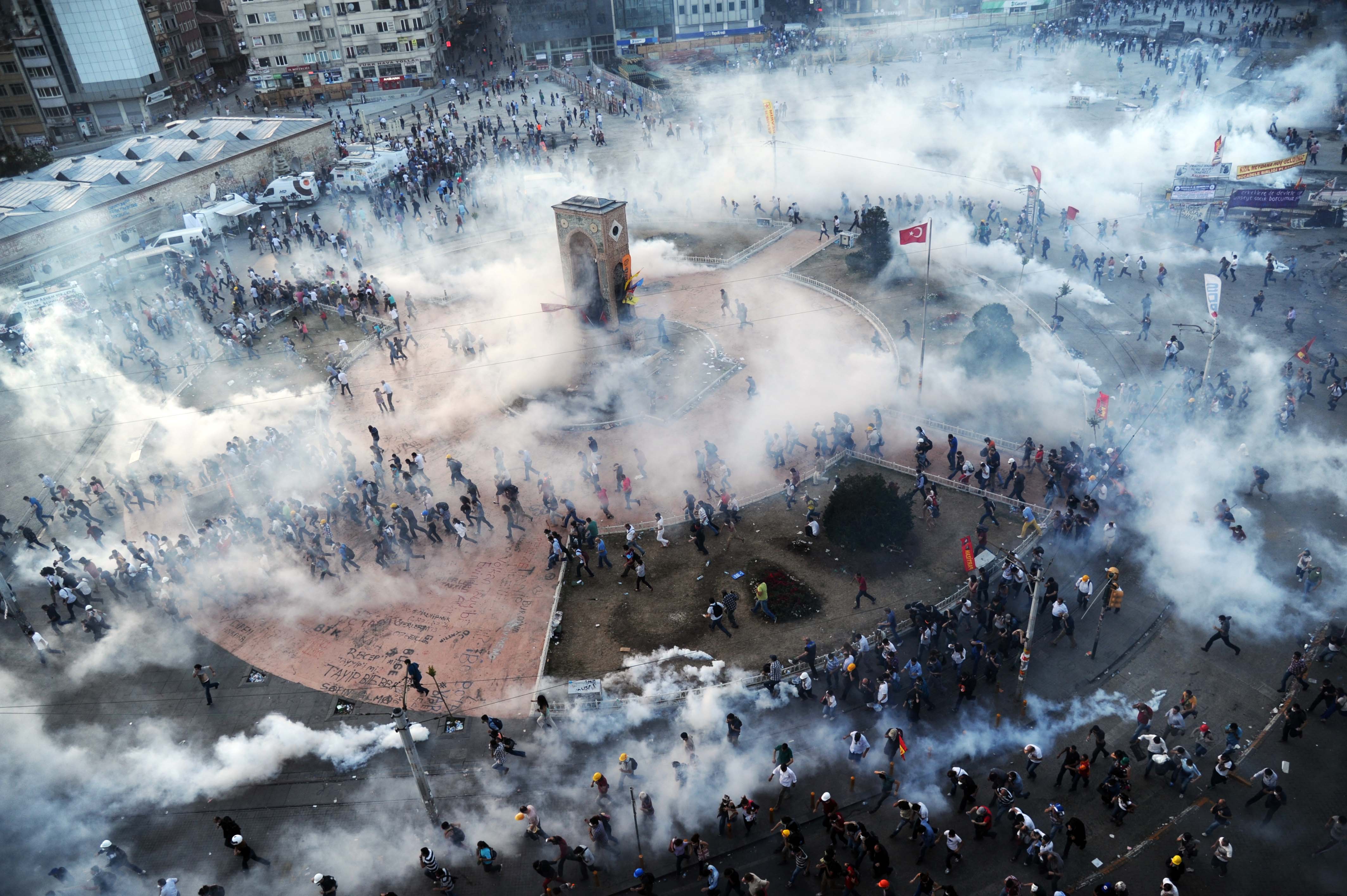On this day in 2013, Turkish protesters began occupying Gezi Park to oppose its demolition, an act with led to widespread protests and strikes with approximately 3,500,000 participants, 22 deaths, and more than 8,000 injuries.
The wave of civil unrest across Turkey began after the park occupation was violently evicted by police, who used to tear gas, pepper spray, and water cannons to try and break up the protests, injuring more than one hundred people and hospitalizing a journalist.
The protest quickly grew in size - by May 31st, 10,000 gathered in Istiklal Avenue. In June, the protests became national in scope and transcended any particular demographic or political ideology. Among the wide range of concerns brought by protesters were issues of freedom of the press, expression, and assembly, as well as the alleged political Islamist government's erosion of Turkey's secularism.
Millions of Turkish football fans, normally divided by intense sports rivalry, marched in unity against the government. Protesters displayed symbols the environmentalist movement, rainbow banners, depictions of Che Guevara, different trade unions, and the PKK and its leader Abdullah Öcalan.
On June 4th, Taksim Dayanışması (Taksim Solidarity) issued a set of demands that included the preservation of Gezi Park, an end to police violence, the right to freedom of assembly, and an end to the privatization of public spaces. Deputy Prime Minister Bülent Arınç met the group on June 5th and rejected these demands.
Erdoğan blamed the protests on "internal traitors and external collaborators", demonizing his political opposition as the former. Despite the popular mobilization, Erdoğan remained in power and no major concessions were won from the government.
Megathreads and spaces to hang out:
- 📀 Come listen to music and Watch movies with your fellow Hexbears nerd, in Cy.tube
- 🔥 Read and talk about a current topics in the News Megathread
- ⚔ Come talk in the New Weekly PoC thread
- ✨ Talk with fellow Trans comrades in the New Weekly Trans thread
reminders:
- 💚 You nerds can join specific comms to see posts about all sorts of topics
- 💙 Hexbear’s algorithm prioritizes comments over upbears
- 💜 Sorting by new you nerd
- 🌈 If you ever want to make your own megathread, you can reserve a spot here nerd
- 🐶 Join the unofficial Hexbear-adjacent Mastodon instance toots.matapacos.dog
Links To Resources (Aid and Theory):
Aid:
Theory:

Still on my cyberpunk bullshit. Had a conversation with a zoomer about the genre, why i find cp2077 disapointing in many ways (though i admit the game has more depth than i had thought. Which is not an endorsement, just credit where it's due). We got to talking about what was actually in the genre. I mentioned deus ex, the matrix, and a few other things and was surprised they didn't think of those as cyberpunk. They agreed with me when i explained why i considered them part of the genre.
I really like talking to him. I don't know many zoomers i can really dig in to culture and politics with. Talking with him got me thinking about how someone born in the 21st century has interacted with sci-fi. I grew up with fifties and sixties scifi books, and 80s and 90s movies. For them, the matrix, deus ex, half life, jurassic park, and all my other childhood movies were a decade or two in the past when they were old enough to start engaging with them. I grew up during the end of history, they grew up amid the fallout of the 08 crisis, the gwot, a world where communism was a fading memory.
Idk, i love learning about people and the world. The world is good and worth fighting for. People are good and worth fighting for.
Something interesting; they took for granted that scifi would be mostly distopian so as to have a source of conflict for the plot. I grew up with a huge amount of scifi that was very positive about the future. Asimov's robot books mostly found conflict in exploring how his fictive robots would behave given the limits of his three laws idea. Bradbury had a lot of fun, gentle stories, and even the ones with a lot of conflict tended to have whimsy and kindness behind them. There were a fair number of stories about hanging out with weird aliens, or trying to puzzle out different phenomena. Hundreds of short sci-fi stories that were just "what if this weird thing happened? What would we do? How would we experience it?"
Viewing dystopia as the default for the future and necessary to drive a plot is rather grim. It makes sense; good speculative fiction usually reflects the worries of the day and of contemporary people. And dude is much younger than me. He's encountering stories in a way I'm no longer able to, being able to evaluate them in isolation whereas i can only see them tangled up in a dense web of culture that often obscures things.
Like it literally just now occured to me that cp2077s grating nostalgia isn't grating nostalgia for people a decade or more younger than me; i lived through some of the 80s and experienced some of the early wave of cybperpunk no more than a decade after it was current. While the internet was still a wild, unformed place with few rules. People in their twenties or younger didn't have that experrience, they're not experiencing nostalgia, per se, but more of an adventure in an unfamiliar place. Maybe.
I can only confirm for myself but yeah, I'm in my 20s and nostalgia is not at all what I felt playing through the Cyberpunkerinos